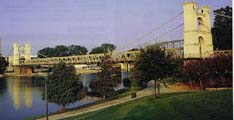
|

|
Squabbles hardly unique in Baylor historyThomas E. Turner March 3, 2003 |
|
Ah, spring has sprung and summer cometh. All the familiar signs are back. The flowers and trees are blooming and thirsting. The sudden storms are ravaging. And Baylorites are at each other's throats, this time over such Christian controversies as control and cash. For whatever comfort, it has always been thus. Since Baylor convened her first class in May 1846, in a ramshackle borrowed building with 24 students, an Episcopalian teacher and no president, she has had to contend with chaos and controversy — even before high-priced sports were added to the cauldron. As we used to say in Hill County, I got no dog in that fight. But Abner McCall, Herbert H. Reynolds and I (choose your own order) passed on a thriving Baylor to posterity. So I'll always have a nostalgic interest. Also, it is generally known that I became, despite my lifelong Methodism, the self-acknowledged ultimate authority on Baylor history. Quite simply, in her 158 years, Baylor has had very few peaceful ones. No Baylor president has ever had a trouble-free reign. The first one, at Independence, Henry Lee Graves didn't show up until two years after the school's chartering. He served some five years, always scrounging for money. During that time, four of the original 15 trustees resigned, one died, one was "asked to resign," and the first professor absconded, tired of poverty. That set the pattern. Baylor departed Independence partly because of a bitter feud between the heads of the male and the female departments. For 100 years — 1845-1945 — Baylor scraped by valiantly, narrowly dodging bankruptcy. On one occasion, she was sold at a public auction, to pay a roofing bill. She was bought by a good Baptist, and given back. It was the same story for many universities of that time. Then the post-World War II boom, ignited by a grateful government's GI Bill, gave Baylor a rags-to-riches transformation. It was fueled mostly by her splendid products: accountants, lawyers, CEOs, business and civic leaders, and outstanding citizens. |
Ironically, prosperity can pose as many problems as poverty. New and tricky decisions are required — to follow old familiar roles or run with the big dogs? Put big money into big buildings and big teams or mostly into people? To be the best where you are, or become international? Such decisions are never easy, and in higher education they are greatly more complex. Normal rules and logic don't apply to universities. If national inflation is four percent, colleges raise tuition by 12 percent. Preachers and college presidents often equate size with superiority. And the trustees, the faculty, the students and the alumni all assume they are in charge. When just one is, Big Trouble is inevitable. Back in the '50s, a loyal Baylorite beqeathed to Baylor a modest motel on Corpus Christi's beach. It turned out to be a bawdy house. Together with the late, great Dean W.C. Perry I ran down to Corpus to look into the matter. I think that everybody figured that as a Methodist and an ex-reporter, I'd be more familiar with dealing with brothels. We speedily sold the property. Real estate folks were eager to obtain the location. I well recall explaining to a local Baptist pastor there that it certainly would violate Baylor's standards to profit from a house of ill-repute. "Of course," he smiled, "though in this case, a lot of the income would be from Baptists." He was kidding. I guess. Thomas E. Turner, who died in 2008, was a long-time columnist for the Tribune-Herald and a Baylor University administrator. |
|
Return to First Person home page |
|